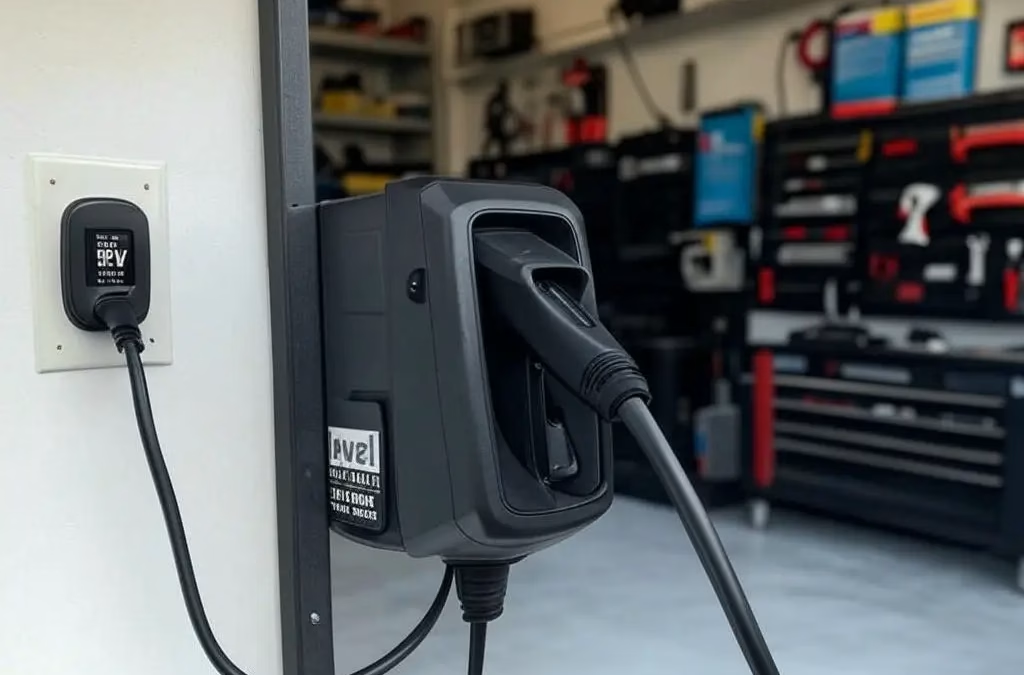Expert Installation by Cornelius Electrical Contractors in Palm Bay, FL
As electric vehicles (EVs) become increasingly popular in Palm Bay, Florida, and surrounding areas, understanding the components of EV charging systems is essential for homeowners and businesses looking to adopt this eco-friendly technology. At Cornelius Electrical Contractors, we specialize in installing and maintaining EV charging infrastructure to ensure safe, efficient, and reliable charging for your electric vehicle. Whether you’re new to EVs or upgrading your setup, we’re here to clarify the difference between an EV receptacle and an EV charger and provide professional installation services tailored to your needs. For more information or to schedule a consultation, Call: 321-674-9667.
What Is an EV Receptacle?
An EV receptacle is the physical outlet or socket where an EV charger’s plug connects to the electrical system. Think of it as the plug-in point—the interface between your home or business’s electrical infrastructure and the EV charger. Designed to accommodate the specific plug type of the charger, the receptacle delivers alternating current (AC) power from your electrical panel to the charger.
Receptacles vary depending on the charging level and plug configuration. For instance:
- Level 1 Charging: Uses a standard 120V household outlet, commonly found in garages or exterior walls.
- Level 2 Charging: Requires a 240V outlet, similar to those used for electric dryers or ovens, which provides faster charging.
Proper installation of an EV receptacle is critical to ensure safety and compatibility with your charger. At Cornelius Electrical Contractors, our licensed electricians assess your electrical system to install the right receptacle for your EV charging needs. Ready to get started? Call: 321-674-9667 to discuss your options.
What Is an EV Charger?
The EV charger, also known as Electric Vehicle Supply Equipment (EVSE), is the device that converts the AC power from the receptacle into direct current (DC) power, which is used to charge your vehicle’s battery. The charger manages the charging process, ensuring the correct voltage and current are delivered safely to your EV.
EV chargers come in different types to match various vehicles and charging speeds:
- Level 1 Chargers: Plug into standard 120V outlets and are ideal for overnight charging, though they charge more slowly.
- Level 2 Chargers: Connect to 240V outlets and offer faster charging, making them suitable for home or commercial use.
- DC Fast Chargers: Used primarily in commercial settings, these require specialized high-voltage systems.
The charger is the brain of the operation, ensuring your EV receives the power it needs efficiently and safely. Our team at Cornelius Electrical Contractors can recommend and install the right charger for your vehicle and lifestyle. For expert advice, Call: 321-674-9667.
Key Differences Between EV Receptacles and Chargers
While the terms “receptacle” and “charger” are sometimes used interchangeably, they serve distinct roles:
- EV Receptacle: The outlet or socket that provides the electrical connection point for the charger. It does not convert or manage power—it simply delivers AC power from your electrical system.
- EV Charger: The device that plugs into the receptacle, converts AC power to DC power, and manages the charging process for the vehicle’s battery.
Understanding this distinction is important when planning your EV charging setup. For example, installing a Level 2 charger may require upgrading your electrical panel or wiring a dedicated 240V circuit, tasks that Cornelius Electrical Contractors handles with precision.
Why does ev receptacle need GFCI protection?
An EV receptacle requires GFCI (Ground Fault Circuit Interrupter) protection to enhance safety by preventing electrical shocks and reducing the risk of fires. When charging an electric vehicle, the receptacle is exposed to high electrical loads, often in environments like garages where moisture or dust may be present. A GFCI monitors the current flowing through the circuit and quickly cuts power if it detects an imbalance—such as current leaking to ground due to a fault, damaged wiring, or accidental contact with water. This rapid response protects users from serious injury and safeguards the EV charging equipment from potential damage. Cornelius Electrical Contractors ensures proper GFCI installation for all EV receptacles
Why Choose Cornelius Electrical Contractors?
Based in Palm Bay, Florida, Cornelius Electrical Contractors proudly serves homeowners and businesses in Palm Bay and surrounding areas, including Melbourne, Viera, and West Melbourne. Our experienced electricians are trained in the latest EV charging technologies, ensuring your receptacle and charger installation meets all safety codes and manufacturer specifications.
We offer:
- Custom Assessments: We evaluate your electrical system to determine the best receptacle and charger for your needs.
- Professional Installation: From wiring 240V circuits to mounting Level 2 chargers, we handle every detail.
- Ongoing Support: Need maintenance or upgrades? We’re here to help keep your charging system running smoothly.
Whether you’re installing a basic Level 1 setup or a high-powered Level 2 charger, we prioritize safety, efficiency, and customer satisfaction. To learn more about our EV charging services, Call: 321-674-9667.
Get Your EV Charging System Installed Today
As EVs continue to transform transportation in Palm Bay and beyond, having a reliable home or business charging station is a game-changer. Cornelius Electrical Contractors is your trusted partner for expert EV receptacle and charger installations. Let us help you power your electric vehicle with confidence.
For a free consultation or to schedule your installation, Call: 321-674-9667 today. We look forward to serving you in Palm Bay, Florida, and surrounding communities!


